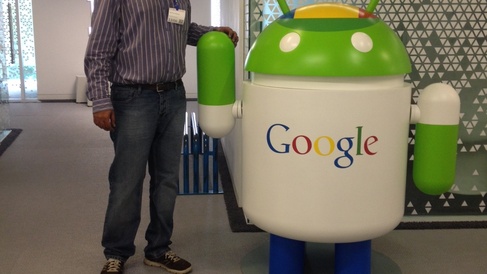
Google is interested in energy efficient mobile sensing research work produced by CSIC Research Associate Dr Sarfraz Nawaz, who has been invited to give a talk at the multinational corporation about smartphone sensing for commuting-related applications.
Dr Nawaz will present at Google’s London office on 13 June. “My talk is about smartphone sensing for commuting related applications. Google is interested in these applications because it wants to enhance its existing offerings, Google Maps and Google Now, with new features and create new products. Google also has a keen interest in pushing its Android OS into cars. Apple has already moved into the area with their CarPlay system.”
Dr Nawaz will present two smartphone-based sensing systems that leverage low power sensors as opposed to traditional location sensing technologies on smartphones. “I will show that by using alternative sensors available on smartphones, not only can we can save significant amounts of energy but also achieve similar sensing performance and work around some of the issues related to location sensors.
“ParkSense is a smartphone-based sensing system that detects if a driver has vacated a parking spot. It leverages ubiquitous Wi-Fi interface of the phone to detect these un-parking events. It performs Wi-Fi fingerprint matching followed by the rate of change of visible Wi-Fi networks to determine if the user has returned to the vehicle and driven away. When coupled with electronic parking payment systems in use today, this approach can provide a complete system for sensing on-street parking spaces and thus reduce urban congestion and improve overall user experience.”
The second system that Dr Nawaz will present to Google aims to sense and recognise significant driving routes of a user, i.e. routes that a user usually drives on during his or her daily routine. Sensing these significant routes will allow the development of novel applications, such as personalised travel alerts, running late notifications to friends and family and smart domestic-heating systems that are triggered by the user travelling to or from the home.
Dr Nawaz said: “I will show that these significant routes can be recognised by sensing forces experienced by the phone while in transit using MEMS motion sensors like accelerometer and gyroscope embedded in the phone.”
Dr Jennifer Schooling, Director of CSIC, said: “The Centre’s output attracts the interest of a cross-section of industry and business. The sensing systems developed by Dr Nawaz link to the wider progress CSIC is making in smart data work resulting in our own knowledge library of UK cities and their demographic, socio-economic land use and transport data.”
